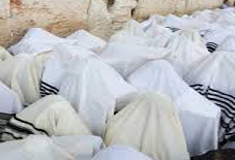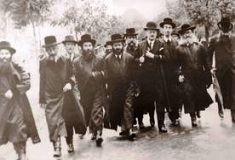How to Bless Others Correctly So Our Blessings Can Come True
הרב שי טחןיג סיוון, תשפד19/06/2024why should that blessing come about? Do we have spiritual powers to help out? Do we possess supernatural powers?
תגיות:ברכת כהניםברכהיהודים
צילום: jewish-photos.com
Jews often shower others with many blessings, whether for health, a good life, successful children, etc. However, blessings have rules that need to be followed in order for the bracha to be answered. One reason is that when we bless people with all these wonderful things, why should that blessing come about? Do we have spiritual powers to help out? Do we possess supernatural powers?
For example, the Chida (Dvash Lepi b, 9) brings from the Zohar that when blessing people, one must first bless Hashem; otherwise, the blessing does not carry any weight and remains unfulfilled. Why is that so?
any weight and remains unfulfilled. Why is that so?
Let's delve into our parasha (Beaalotcha) and explore to find an answer to our question.
The structure of the menorah is described in detail in the Torah. It had seven branches, forming a candelabrum. Our parsha opens with the command to light the menorah in the Beit Hamikdash. Interestingly, the Torah explains that the menorah is named after the middle light, while the other six lights should face towards the middle one. The Gemara (Shabbat 22, 2) elaborates that while those six candles faced the middle, the middle candle faced upwards towards Hashem as a testimony that Hashem is always present amongst our nation. According to Sforno (Bamidbar 8, 2), this signifies the blessing that comes from Hashem to the world. The middle candle receives the blessing from above and shares it with the other six lights. For this reason, the middle candle did not burn out; it was lit when the Kohen came to light the other six candles and remained lit even when the others burnt out.
That is the reason the menorah is named after the middle light, as it is the light that brings abundance to the rest of the lights, similar to how Hashem sends all abundance to the entire world.
This idea is reinforced by the Birkat Kohanim mentioned in last week's parsha (Bamidbar 6, 23-27):
Hashem should bless you and protect you!
Hashem should deal kindly and graciously with you!
Hashem should bestow favor upon you and grant you peace!
Thus they shall link My name with the people of Israel, and I will bless them.
Most of us know this bracha by heart, especially Sephardim who hear Birkat Kohanim daily in shul. However, we often overlook an important detail: the bracha is divided into three separate blessings, each conveying a different type of blessing, and in each one, the Kohanim mention that Hashem should send the blessing.
Rashbam (Bamidbar 6, 23) explains that the reason for mentioning Hashem's name all three times is to emphasize and teach that when a person blesses his friend, he should not just give a blessing but must include in his request a form of prayer that Hashem should bestow that blessing. Building on this idea, when we look through the multiple places in the Torah where blessings are mentioned, we find that almost always, the people giving the blessing do not directly give the blessing but rather ask specifically for Hashem to bless the person.
For example, when Yitzchak gives a bracha to Yaakov, he prays to Hashem and says, "May Hashem give you of the dew of the heavens, etc." When Yaakov blesses his grandchildren, he does not simply say they should be blessed but rather asks that "Hashem, who has shepherded me from my inception until this day, should assign His angel to bless the boys" (this explanation is according to Rabbi Avraham ben HaRambam). Then he continues and says, "May Hashem make you like Ephraim and Menashe." When Moshe blesses the twelve tribes, he mentions Hashem's name over and over again: for Yehudah, "O Hashem, hear Yehudah's voice"; for Levi, "Hashem, bless his resources and favor his work."
For example, the Chida (Dvash Lepi b, 9) brings from the Zohar that when blessing people, one must first bless Hashem; otherwise, the blessing does not carry

צילום: jewish-photos.com
Let's delve into our parasha (Beaalotcha) and explore to find an answer to our question.
The structure of the menorah is described in detail in the Torah. It had seven branches, forming a candelabrum. Our parsha opens with the command to light the menorah in the Beit Hamikdash. Interestingly, the Torah explains that the menorah is named after the middle light, while the other six lights should face towards the middle one. The Gemara (Shabbat 22, 2) elaborates that while those six candles faced the middle, the middle candle faced upwards towards Hashem as a testimony that Hashem is always present amongst our nation. According to Sforno (Bamidbar 8, 2), this signifies the blessing that comes from Hashem to the world. The middle candle receives the blessing from above and shares it with the other six lights. For this reason, the middle candle did not burn out; it was lit when the Kohen came to light the other six candles and remained lit even when the others burnt out.
That is the reason the menorah is named after the middle light, as it is the light that brings abundance to the rest of the lights, similar to how Hashem sends all abundance to the entire world.
This idea is reinforced by the Birkat Kohanim mentioned in last week's parsha (Bamidbar 6, 23-27):
Hashem should bless you and protect you!
Hashem should deal kindly and graciously with you!
Hashem should bestow favor upon you and grant you peace!
Thus they shall link My name with the people of Israel, and I will bless them.
Most of us know this bracha by heart, especially Sephardim who hear Birkat Kohanim daily in shul. However, we often overlook an important detail: the bracha is divided into three separate blessings, each conveying a different type of blessing, and in each one, the Kohanim mention that Hashem should send the blessing.
Rashbam (Bamidbar 6, 23) explains that the reason for mentioning Hashem's name all three times is to emphasize and teach that when a person blesses his friend, he should not just give a blessing but must include in his request a form of prayer that Hashem should bestow that blessing. Building on this idea, when we look through the multiple places in the Torah where blessings are mentioned, we find that almost always, the people giving the blessing do not directly give the blessing but rather ask specifically for Hashem to bless the person.
For example, when Yitzchak gives a bracha to Yaakov, he prays to Hashem and says, "May Hashem give you of the dew of the heavens, etc." When Yaakov blesses his grandchildren, he does not simply say they should be blessed but rather asks that "Hashem, who has shepherded me from my inception until this day, should assign His angel to bless the boys" (this explanation is according to Rabbi Avraham ben HaRambam). Then he continues and says, "May Hashem make you like Ephraim and Menashe." When Moshe blesses the twelve tribes, he mentions Hashem's name over and over again: for Yehudah, "O Hashem, hear Yehudah's voice"; for Levi, "Hashem, bless his resources and favor his work."
הוסף תגובה
עוד מהרב שי טחן
עוד בנושא טור אישי







